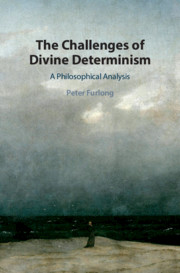Book contents
- The Challenges of Divine Determinism
- The Challenges of Divine Determinism
- Copyright page
- Dedication
- Contents
- Acknowledgments
- Introduction
- Chapter 1 A Primer on Divine Determinism
- Chapter 2 Divine Determinism and Free Will
- Chapter 3 Divine Determinism and Free Will
- Chapter 4 Divine Determinism and the Author of Sin Objection
- Chapter 5 Divine Determinism and the Blameworthiness Objection
- Chapter 6 Divine Determinism and the Free Will Defense
- Chapter 7 God, Determined Agents, and Love
- Chapter 8 Divine Commands, the Divine Will, and Divine Blame
- Conclusion
- References
- Index
Chapter 4 - Divine Determinism and the Author of Sin Objection
Published online by Cambridge University Press: 07 June 2019
- The Challenges of Divine Determinism
- The Challenges of Divine Determinism
- Copyright page
- Dedication
- Contents
- Acknowledgments
- Introduction
- Chapter 1 A Primer on Divine Determinism
- Chapter 2 Divine Determinism and Free Will
- Chapter 3 Divine Determinism and Free Will
- Chapter 4 Divine Determinism and the Author of Sin Objection
- Chapter 5 Divine Determinism and the Blameworthiness Objection
- Chapter 6 Divine Determinism and the Free Will Defense
- Chapter 7 God, Determined Agents, and Love
- Chapter 8 Divine Commands, the Divine Will, and Divine Blame
- Conclusion
- References
- Index
Summary
Critics of divine determinism sometimes claim that determinists make God the author of sin. This chapter takes up the question of whether this is true. I begin by disambiguating the claim, focusing on reading the charge as equivalent to the claim that God causes sin. I begin by considering a reply to this objection rooted in the claim that evil is a mere privation. According to this particular reply, sin is composed of the positive act of being (which God does cause) and a defect, which is a mere privation. This defect, the reply claims, is not caused by God, nor by an act of a human agent, but instead by a privation. I present three arguments for thinking that this reply is insufficient. I then suggest that divine determinists consider a more robust reply built off of the same analysis of evil and sin, but which claims that privations, lacking all being, cannot be caused at all.
Information
- Type
- Chapter
- Information
- The Challenges of Divine DeterminismA Philosophical Analysis, pp. 86 - 104Publisher: Cambridge University PressPrint publication year: 2019
